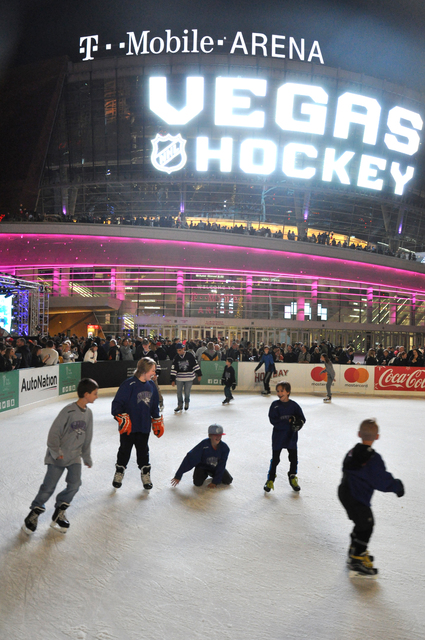
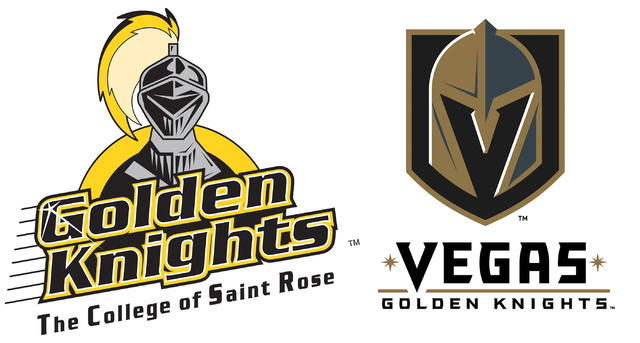
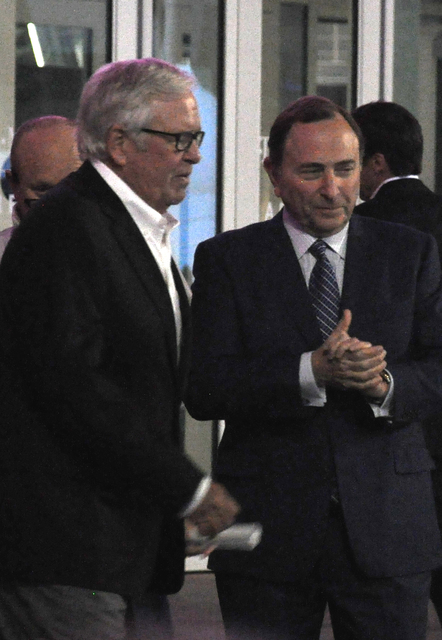
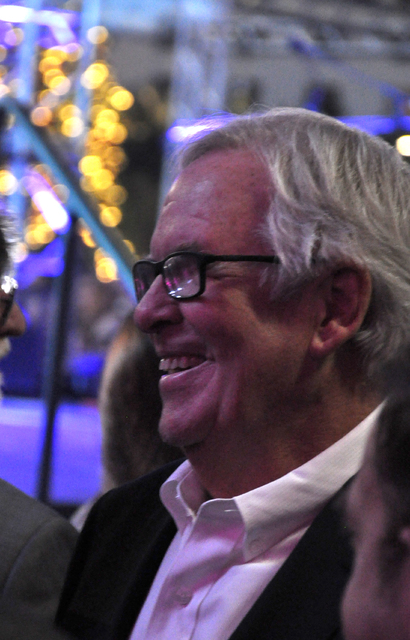
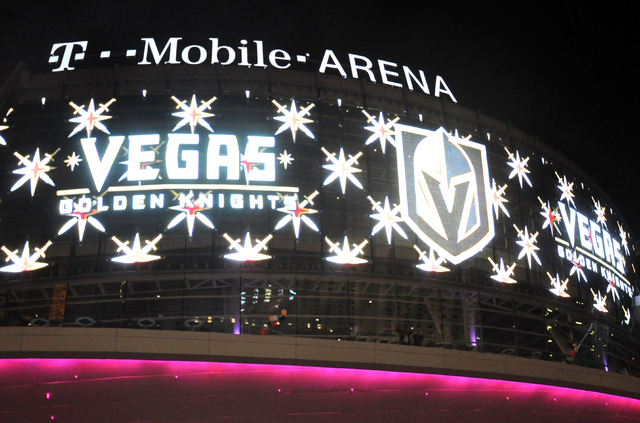
What’s in a name? When it comes to professional sports franchises, the answer is a considerable amount of revenue. North American sports teams generated $67.2 billion in 2015, according to internet-based statistics company, Statista.
The city’s first professional major sports franchise — the National Hockey League’s Vegas Golden Knights — plans to garner its share beginning in 2017. But things already have gone awry.
The trademark request for Golden Knights was denied by the U.S. Patent and Trademark Office on Dec. 7, only two weeks after the unveiling ceremony for the team’s name and logo at T-Mobile Arena.
The decision was due to the likelihood of confusion with the College of St. Rose. Athletic teams representing the 96-year-old private school in Albany New York – with an enrollment of just under 5,000 — are named the Golden Knights and sport a color scheme of black, gold and white, very similar to the Las Vegas NHL club. They compete in 12 NCAA Division II sports but do not have either a women’s or men’s hockey team.
“We are currently reviewing the Trademark Office’s letter and will prepare a detailed response demonstrating why we continue strongly to believe the Vegas Golden Knights mark should be registered in co-existence with the college registration, just as a number of other nicknames currently co-exist in professional and college sports (particularly where there is no overlap as to the sport for which the nickname is being used),” said NHL Deputy Commissioner Bill Daly, via a written statement.
“We consider this a routine matter and it is not our intention to reconsider the name or logo of this franchise. We fully intend to proceed as originally planned, relying on our common law trademark rights as well as our state trademark registrations while we work through the process of addressing the question raised in the federal applications.”
It is not uncommon for trademark requests to be initially denied by the office before being subsequently approved with modifications or consent from affected parties. The Las Vegas NHL team has until June 7 to file a response to the decision, and officials from St. Rose have thus far not ruled out legal action in the matter. Foley holds trademark and domain name rights to two other possible names — Silver Knights and Desert Knights. So the name of the team that takes the ice in October remains an open question, despite league protestations.
“This is pretty much where (Foley) started with this a long time ago,” said University of Nevada, Las Vegas professor Dr. James Cross, who specializes in marketing. “He said he was going to work on trademark issues, but at the end of the day is back pretty much where he started. I would think a sophisticated investor like Mr. Foley would have attorneys checking this out.”
“Right off the top, it looks like they didn’t do their due diligence,” said corporate branding expert Dr. John Schibrowsky of UNLV.
“But that’s not what happened. If you are not going to tell anybody what your name is going to be, you don’t know if anybody is going to claim that your name will be confused with their team. So there is no negligence, it is not a case of somebody not doing their job. It’s not a great big deal at this point. They probably don’t have a great deal of merchandise printed. If they do have to change the name, those will become collector’s items.”
Although seven NHL teams share trademarked names with other pro sports franchises or major colleges (The Florida and Carolina Panthers, New York and Texas Rangers, Los Angeles and Sacramento Kings, Winnipeg and New York Jets, Carolina and Miami Hurricanes, Anaheim and Oregon Ducks, Boston and UCLA Bruins), trademark issues have forced changes in team identities, such as the color scheme adjustment of the Jacksonville Jaguars when they entered the league in 1995.
Merchandising has become a significant stream of revenue in professional sports and great attention is paid to product marketing potential when branding new franchises.
“Looking at it from a brander’s perspective, you want something that is relatively distinctive, Schibrowsky said. “But the name is probably less important than performance, at some point in time. The Canadiens, Red Wings, Maple Leafs, some of these franchises that have been around forever, they try to maintain their tradition. But all the new franchises that come out try to get something a little bit unique. They are hoping that the logo and the name will be strong enough that it will actually drive some merchandise sales.”
Merchandise manufacturers pay licensing fees to the NHL, which become part of Centrally Generated League Revenues. That money goes in part to revenue sharing (6 percent of revenue redistributed to the least financially healthy franchises — half of the total league income is from the top 10 revenue-generating teams), and the remainder is divvied equally among the 31 franchises. In other words, the Las Vegas franchise would receive the same percentage of revenue from the purchase of a Chicago Blackhawks Jonathon Toews official game jersey — the most popular in 2015 — as it would from a Golden Knights cuffed knit cap.
The exception is revenue from merchandise purchased from team-owned stores, such as an arena gift shop — which goes fully to the team. Retailers who are not NHL entities keep 100 percent of the markup from wholesale.
The structure parallels other major sports leagues, including the National Football League, except for the Dallas Cowboys, who do not share merchandising revenue with the league (or receive any from the NFL). The decision has been a financial boon to the Cowboys, who are the league’s most valuable franchise with an estimated worth of $4 billion.
NHL fans are considered among the most loyal to the sport and their individual teams, and merchandise sales generate considerable revenue. The total revenue generated by the NHL in 2015 was $4.1 billion, according to Statista. Just over half of the NHL revenue stream is from ticket sales. The league receives slightly more than $600 million in television rights, accounting for about 17 percent of the revenue total. The league does not release merchandise revenue numbers or break down merchandise dollars by team.
But the Golden Knights question extends far beyond merchandise sales. As in any business, branding is a critical element, and in the case of a sports franchise, name, logo and color scheme become an identity that transcends, over time, the personality of any individual who wears those colors. Players come and go, but the consumers of this particular product tend to nail their colors to the mast.
The league’s most lucrative team is the New York Rangers, according to Forbes, with a value of $1.2 billion and $229 million in revenue from the 2014-15 season. The Montreal Canadiens place second with a value of $1.18 billion and $219 billion in revenue last season. The Toronto Maple Leafs, Chicago Black Hawks and Boston Bruins round out the top five.
It is worth noting that all of these teams have deep cultural roots in their communities as members of the Original Six – along with the Detroit Red Wings, who rank eighth — who were the only NHL franchises between 1942 and the 1967 expansion. These six clubs collectively have amassed more than five centuries of seasons and 64 Stanley Cups.
On the other side of the money table is the Florida Panthers with a franchise value of $186 million and a 2014-15 revenue total of $93 million. Just ahead of the Panthers, in ascending order, are the Phoenix Coyotes, Carolina Hurricanes, Columbus Blue Jackets and Nashville Predators.
None of these teams existed in their respective cities before 1993, and only the Hurricanes have a Stanley Cup title. There are also cities without a long tradition of support for the sport at all levels.
The NHL once before featured a “Golden” franchise — the California Golden Seals came into the league in 1967 as the Oakland Seals and altered their name in 1970.
The Golden Seals struggled on the ice and at the box office and departed in 1976 to become the Cleveland Barons.
The Barons were no more fortunate than the Golden Seals and were forced to merge with the Minnesota North Stars — now the Dallas Stars — at the end of the 1977-78 season.
Las Vegas hockey fans hope the fate of the Knights will be significantly more golden. Unless, of course, the Golden Age of the Knights is already over.







